Related Research Articles
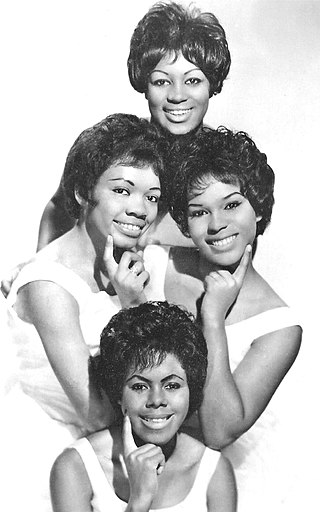
The Shirelles were an American girl group formed in Passaic, New Jersey in 1957. They consisted of schoolmates Shirley Owens, Doris Coley, Addie "Micki" Harris, and Beverly Lee.
Bertrand Russell Berns, also known as Bert Russell and (occasionally) Russell Byrd, was an American songwriter and record producer of the 1960s. His songwriting credits include "Twist and Shout", "Piece of My Heart", "Here Comes the Night", "Hang on Sloopy", "Cry to Me" and "Everybody Needs Somebody to Love", and his productions include "Baby, Please Don't Go", "Brown Eyed Girl" and "Under the Boardwalk".
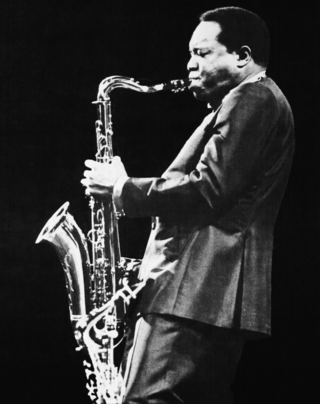
Curtis Ousley, known professionally as King Curtis, was an American saxophonist who played rhythm and blues, jazz, and rock and roll. A bandleader, band member, and session musician, he was also a musical director and record producer. A master of the instrument, he played tenor, alto, and soprano saxophone. He played riffs and solos on hit singles such as "Respect" by Aretha Franklin (1967), and "Yakety Yak" by The Coasters (1958) and his own "Soul Twist" (1962), "Soul Serenade" (1964), and "Memphis Soul Stew" (1967).

"Twist and Shout" is a 1961 song written by Phil Medley and Bert Berns. It was originally recorded by the Top Notes, but it did not become a hit in the record charts until it was reworked by the Isley Brothers in 1962. The song has been covered by several artists, including the Beatles, Salt-N-Pepa, and Chaka Demus & Pliers, who experienced chart success with their versions.
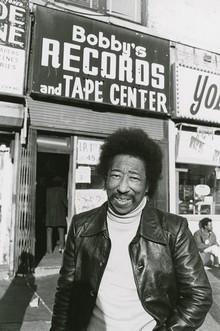
Morgan Clyde "Bobby" Robinson was an American independent record producer and songwriter in New York City, most active from the 1950s through the mid-1980s.
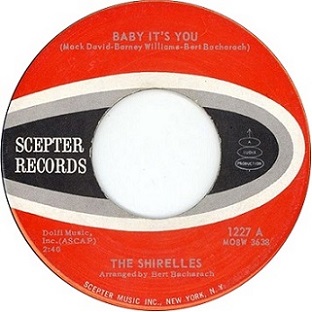
"Baby It's You" is a song written by Burt Bacharach (music), Luther Dixon, and Mack David (lyrics). It was recorded by the Shirelles and the Beatles and was a hit for both. The highest-charting version of "Baby It's You" was by the band Smith, who took the track to No.5 on the US charts in 1969.
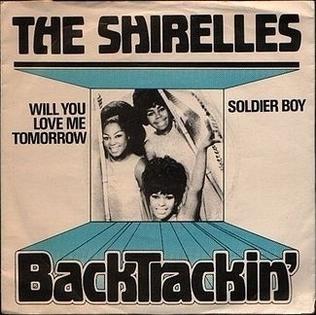
"Will You Love Me Tomorrow", sometimes known as "Will You Still Love Me Tomorrow", is a song with words by Gerry Goffin and music composed by Carole King. It was recorded in 1960 by the Shirelles at Bell Sound Studios in New York City, and hit number one on the Billboard Hot 100 chart. The song was the first by an African-American all-girl group to reach number one in the United States. It has since been recorded by many other artists, including a version by co-writer King released on her 1971 album Tapestry.
"Dedicated To The One I Love" is a song written by Lowman Pauling and Ralph Bass that was a hit for the "5" Royales, the Shirelles, the Mamas & the Papas and Bitty McLean. Pauling was the guitarist of the "5" Royales, the group that recorded the original version of the song, produced by Bass, in 1957. Their version was re-released in 1961 and charted at number 81 on the Billboard Hot 100.

"Oh No Not My Baby" is a song written by Gerry Goffin and Carole King. The song's lyrics describe how friends and family repeatedly warn the singer about a partner's infidelities. The song is regarded as an American standard due to its long-time popularity with both music listeners and recording artists.

"Rock Me Baby" is a blues standard that has become one of the most recorded blues songs of all time. It originated as "Rockin' and Rollin'", a 1951 song by Lil' Son Jackson, itself inspired by earlier blues. Renditions by Muddy Waters and B.B. King made the song well-known. When B.B. King's recording of "Rock Me Baby" was released in 1964, it became his first single to reach the Top 40 in Billboard magazine's Hot 100 chart.

"Please Come Home for Christmas" is a Christmas song, written in 1960 and released the same year by American blues singer and pianist Charles Brown. Hitting the Billboard Hot 100 chart in December 1961, the tune, which Brown co-wrote with Gene Redd, peaked at position number 76. It appeared on the Christmas Singles chart for nine seasons, hitting number 1 in 1972. It includes a number of characteristics of Christmas music, such as multiple references in the lyrics to the Christmas season and Christmas traditions, and the use of a church bell type sound, created using tubular bells, at the start of the song. The song has been covered by many artists, including by Eagles, Etta James and Cher.
"Mashed Potato Time" is a 1962 single written by Kal Mann and Bernie Lowe, and performed by Dee Dee Sharp, with backing vocals by The Orlons, on her debut album It's Mashed Potato Time. The song refers to the Mashed Potato dance move, which was a fad. It was one of several songs that at that time that referenced the dance, another being James Brown's "Mashed Potatoes U.S.A." The Marvelettes song "Please Mr. Postman" is mentioned in the lyrics and is copied in the arrangement. Also mentioned in the lyrics are the songs "The Lion Sleeps Tonight" by the Tokens and "Dear Lady Twist" by Gary U.S. Bonds. Sharp recorded a sequel to "Mashed Potato Time" called "Gravy ".
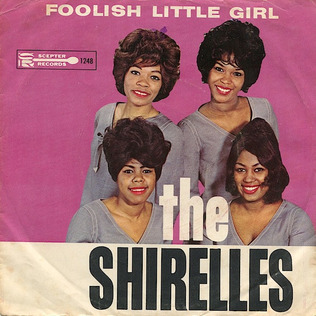
"Foolish Little Girl" is a song written by Helen Miller and Howard Greenfield and performed by The Shirelles. The song reached #4 on the Billboard Hot 100, #9 on the R&B chart, and #38 on the UK Singles Chart in 1963. The song appeared on their 1963 album, Foolish Little Girl. The song was ranked #57 on Billboard magazine's Top Hot 100 songs of 1963.
"Big John (Ain't You Gonna Marry Me)" is a song written by John Patton and Amiel Sommers and performed by The Shirelles. It was featured on their 1962 album, Baby It's You.
"How Many Tears" is a song written by Gerry Goffin and Carole King. The song was produced by Snuff Garrett, and performed by Bobby Vee featuring The Johnny Mann Singers. The song reached #10 in the UK, #43 in Canada, and #63 on the Billboard Hot 100 in 1961. It was featured on his 1962 album, Bobby Vee's Golden Greats.

The Top Notes were an R&B vocal group, centered around the singers Derek Martin and Howard Guyton. They released a number of singles in the early 1960s, among which was the first recording of "Twist and Shout", which was a hit when recorded by the Isley Brothers and later by the Beatles.

"Ooh Poo Pah Doo" is a song written and performed by Jessie Hill. It was arranged and produced by Allen Toussaint. The single reached No. 3 on the Billboard R&B chart and No. 28 on the Hot 100 in 1960.

Bell Sound Studios was an independent recording studio in New York City from 1950 to 1976. At its height, the studio was the largest independent recording studio in the United States, and the site of recording sessions that produced seminal hits by Frankie Lymon & the Teenagers, the McGuire Sisters, the Flamingos, Dion and the Belmonts, Paul Anka, Frankie Avalon, the Drifters and Ben E. King, the Four Seasons, Lesley Gore, the Dixie Cups, the Everly Brothers, Buddy Holly, and Kiss.

The Shirelles and King Curtis Give a Twist Party is a 1962 collaborative album between American blues and rhythm and blues saxophonist King Curtis and girl group The Shirelles. In 1968, the album was re-released as Eternally Soul.
References
- ↑ The Shirelles, "Welcome Home, Baby" Chart Positions Retrieved July 10, 2014
- ↑ The Shirelles, The Shirelles and King Curtis Give a Twist Party Retrieved July 10, 2014
- ↑ The Shirelles, "Welcome Home, Baby" single release Retrieved July 10, 2014
- ↑ The Shirelles, "Mama, Here Comes the Bride" Chart Positions Retrieved July 10, 2014